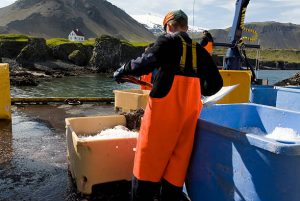Tragedy of the Commons
Project 1: Non-parametric tests of behavior in the commons

Winter view at the fishing boat in the Norwegian fjord. Seascape of a sea in Norway in winter. Mountains covered with snow.
The tragedy of the commons refers to a situation in which individuals with access to a public resource—also called commons—act in their own interest and, in doing so, lead to depletion of the resource. The concept applies to clean air and water (i.e., the issue of pollution), fish (i.e., the issue of overfishing), and other shared natural resources.
Commons problems present behavioral dilemmas, with tensions between individual and collective rationality. When users of a common-pool resource are not effectively excluded, the collective behavior of individuals pursuing their self-interests dissipates economic surplus. We derive a non-parametric test of whether individuals’ collective behavior in resource extraction is consistent with the canonical commons model, namely Nash tragedy-of-the-commons behavior. Applying our approach to panel data of Norwegian commercial fishing vessels, we find behavioral changes due to fisheries management regime changes. This finding is consistent with empirical examinations with difference-in-difference method (see Liu et al. 2024).
Partners/Collaborators
Spencer H. Banzhaf, NC State University
Martin D. Smith, Duke University
Frank Asche, University of Florida, USA & University of Stavanger, Norway
Funding Agencies
Project 2: Quantitative Assessment of Sector Management in Northeastern United States Groundfish Fishery

Reloading fresh fish, Olavsvik, Iceland.
The tragedy of the commons in fisheries refers to a competitive race to fish, leading to overexploitation and economic losses. Rights-based management policies have been shown to slow the race by securing individual rights to a portion of the total catch. Individual fishing quotas (IFQs) and sectors are two forms of Rights-based management regimes that have been implemented over a decade. In the proposed study, we take advantage of the groundfish fisheries managed under IFQs in Norway and Iceland and the groundfish fisheries under sectors in Northeastern U.S. to conduct a quantitative comparative analysis to compare and contrast the performance of these different systems in modifying collective fishing behavior over time.
Funding Agencies
Research Papers and Links
- TBA

